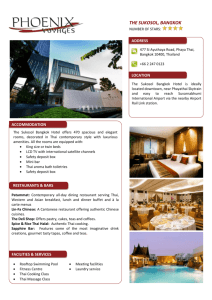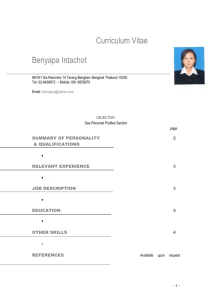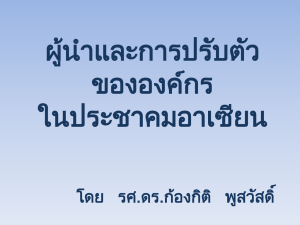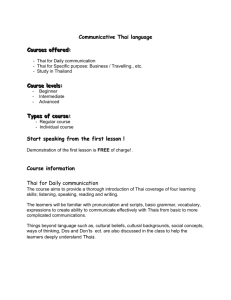Experience report
advertisement
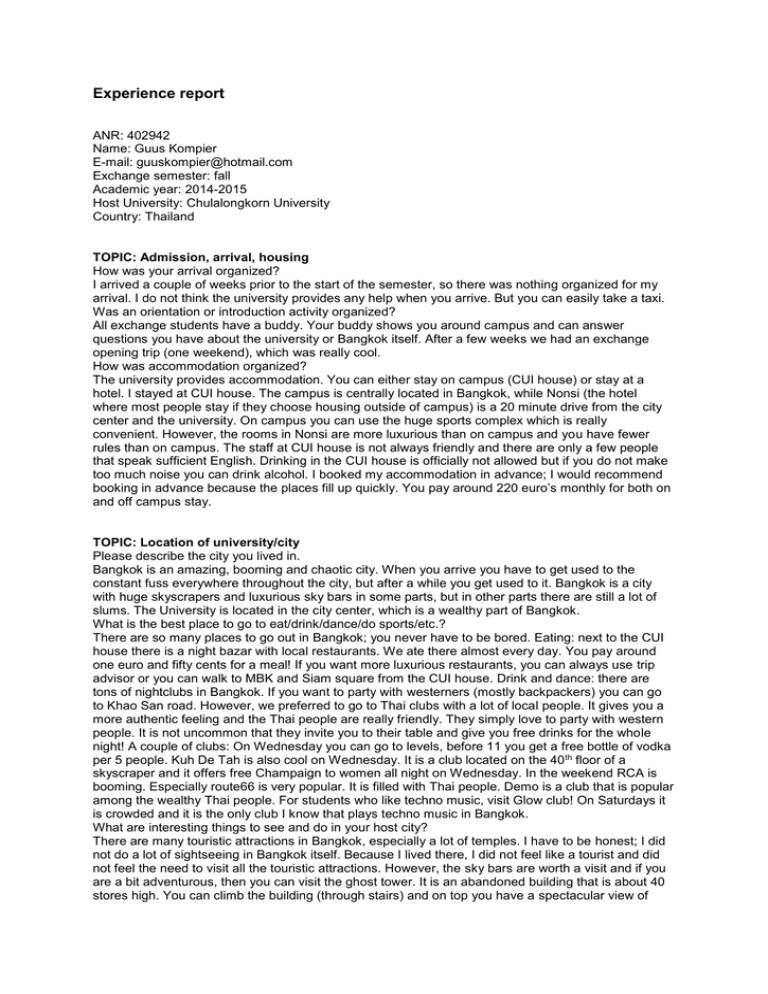
Experience report ANR: 402942 Name: Guus Kompier E-mail: guuskompier@hotmail.com Exchange semester: fall Academic year: 2014-2015 Host University: Chulalongkorn University Country: Thailand TOPIC: Admission, arrival, housing How was your arrival organized? I arrived a couple of weeks prior to the start of the semester, so there was nothing organized for my arrival. I do not think the university provides any help when you arrive. But you can easily take a taxi. Was an orientation or introduction activity organized? All exchange students have a buddy. Your buddy shows you around campus and can answer questions you have about the university or Bangkok itself. After a few weeks we had an exchange opening trip (one weekend), which was really cool. How was accommodation organized? The university provides accommodation. You can either stay on campus (CUI house) or stay at a hotel. I stayed at CUI house. The campus is centrally located in Bangkok, while Nonsi (the hotel where most people stay if they choose housing outside of campus) is a 20 minute drive from the city center and the university. On campus you can use the huge sports complex which is really convenient. However, the rooms in Nonsi are more luxurious than on campus and you have fewer rules than on campus. The staff at CUI house is not always friendly and there are only a few people that speak sufficient English. Drinking in the CUI house is officially not allowed but if you do not make too much noise you can drink alcohol. I booked my accommodation in advance; I would recommend booking in advance because the places fill up quickly. You pay around 220 euro’s monthly for both on and off campus stay. TOPIC: Location of university/city Please describe the city you lived in. Bangkok is an amazing, booming and chaotic city. When you arrive you have to get used to the constant fuss everywhere throughout the city, but after a while you get used to it. Bangkok is a city with huge skyscrapers and luxurious sky bars in some parts, but in other parts there are still a lot of slums. The University is located in the city center, which is a wealthy part of Bangkok. What is the best place to go to eat/drink/dance/do sports/etc.? There are so many places to go out in Bangkok; you never have to be bored. Eating: next to the CUI house there is a night bazar with local restaurants. We ate there almost every day. You pay around one euro and fifty cents for a meal! If you want more luxurious restaurants, you can always use trip advisor or you can walk to MBK and Siam square from the CUI house. Drink and dance: there are tons of nightclubs in Bangkok. If you want to party with westerners (mostly backpackers) you can go to Khao San road. However, we preferred to go to Thai clubs with a lot of local people. It gives you a more authentic feeling and the Thai people are really friendly. They simply love to party with western people. It is not uncommon that they invite you to their table and give you free drinks for the whole night! A couple of clubs: On Wednesday you can go to levels, before 11 you get a free bottle of vodka per 5 people. Kuh De Tah is also cool on Wednesday. It is a club located on the 40 th floor of a skyscraper and it offers free Champaign to women all night on Wednesday. In the weekend RCA is booming. Especially route66 is very popular. It is filled with Thai people. Demo is a club that is popular among the wealthy Thai people. For students who like techno music, visit Glow club! On Saturdays it is crowded and it is the only club I know that plays techno music in Bangkok. What are interesting things to see and do in your host city? There are many touristic attractions in Bangkok, especially a lot of temples. I have to be honest; I did not do a lot of sightseeing in Bangkok itself. Because I lived there, I did not feel like a tourist and did not feel the need to visit all the touristic attractions. However, the sky bars are worth a visit and if you are a bit adventurous, then you can visit the ghost tower. It is an abandoned building that is about 40 stores high. You can climb the building (through stairs) and on top you have a spectacular view of Bangkok. The night- and weekend markets are also worth a visit. Chatuchack weekend market is the biggest one, with more than 10000 stalls. You can literally buy everything here, from clothing to furniture to puppies to snakes. I can also recommend just taking the BTS to a random station and walk for a bit. In every part of Bangkok there is something to do, by just walking through a neighborhood you can have a fun day. What was different than in Tilburg? So much is different than in Tilburg, but the most striking difference is the fuzz in Bangkok. In the Netherlands everything is so organized and quiet. In Bangkok there is something happening on every corner of the street and it is very chaotic. When I came back to the Netherlands it felt so quiet and boring around me, I will have to get used to this structure now again. TOPIC: Academics Which courses did you take and why? 1. Behavioral Economics: I took it because I find it interesting to learn more about the anomalies of the economic theories. There are many ways in which the human behavior does not match these theories. I would not recommend this course. The subject is very interesting, but the material taught is too basic for an academic course. 2. Labor Economics: I wanted to learn more about the labor conditions in different organizations and how labor conditions can affect the profit of companies. I would recommend this course, the workload for this course is higher than average, but the material is very interesting and I have learned quite a lot from this course. 3. Thai Economy: Since I studied in Bangkok, I wanted to learn more about the Thai economy. I would definitely not recommend this course. There are three different teachers and some of them do not speak sufficient English. Next to that, it is very unclear what you can expect on your exam. The structure the teachers use is very confusing and most of the time I had no idea where the teacher was talking about. 4. Economic Development: I wanted to learn more about the differences in economic development throughout the world. I wanted to learn more about the causes and the possible solutions. The course can be a bit boring at times, but some other parts are very interesting. Overall, I can recommend this course. 5. Economic Diplomacy: I heard good things about this course and it was something different than I ever took at Tilburg University. I would definitely recommend this course, because the teacher uses a very different teaching method. Participating during lectures is extremely important. I have never had a lecturer that cared so much about her subject and her students. I you want a course where you do not have to do anything then do not take it. But if you want an interesting course that gives you a different learning experience, then I would advise you to take it! What did the courses add to your program at Tilburg University? The academic level of the courses was lower than in Tilburg. However, you learn a lot from the whole different environment in which you are learning. Participation and homework assignments are very important to Thai lecturers and they put less emphasis on exams. It is also interesting to have classes together with Thai students. You see big differences in the way Thai and European students tackle a problem. European students take a direct approach and answer a question as short as possible, while Thai students write whole stories about everything they know about the subject (on average). This is just one of the differences. I think that the average workload is lower than in Tilburg. You do have more assignments, but the time spent preparing for your exams is significantly lower! Overall, were you happy with your academic achievements during your exchange? Yes Please describe the campus of your host university. The campus is very large; it is a lot bigger than the campus of Tilburg University. It is located in the city center of Bangkok which is very convenient. The campus has multiple eating places where you can eat for about 0.75 eurocents. The campus has a massive and modern sports center with many facilities. The economics faculty is a 20 minute walk from the CUI house, but there is a free shuttle bus every morning. TOPIC: Social life Which social activities organized by the university or students? We had several student activities in the first week to get in touch with the international and Thai students. After a couple of weeks we had an opening trip. Next to these faculty activities you can always join a sports team at the university. Did you have contact with local students? I did have contact with local students, although they are quite shy at first. You have to make contact yourself and start up the conversation, but after that they are very friendly to you. Most of the Thai students do not go out, so I mostly saw them on the campus and I went to a couple of dinners with them. Did you have contact with other exchange students? I did have a lot of contact with exchange students. Every day we met at 7.30 for dinner with a big group. Next to that, we had a Facebook group in which people posted a lot of requests for activities. This made it very easy to spent time with the other exchange students every day. How did you get along with the local students and other exchange students? I got along very good with the other students. I especially liked it that you hang out with people you would normally not hang out with. You get to know people with a different mindset and who live in a whole different social environment. It is very interesting and enriching to spend time with these people. Did you travel to other places/countries during your exchange? During my exchange I went to four islands in Thailand, to the North of Thailand and to Laos. It is very cheap and easy to travel from Bangkok. The exchange coordinator even recommends traveling during your exchange because you can learn more about the country and the region in this way. If you tell your teachers in advance you want to make a trip, it should not be a problem. After my exchange I went to Vietnam and Cambodia. I finished already the first week of December so I decided to travel for 5 weeks which is can definitely recommend. One tip I have for other students: take your time visiting places. Some students do 5 countries in 3 weeks, but in this way you can only visit the touristic spots. In my experience, the nicest way to get to know a country is to hang out with local people and do local things. You need at least a couple of weeks in a country to be able to get to know the culture and the people (just a bit). TOPIC: Living costs How did you finance your exchange period, apart from the grant you received from Tilburg University? I had saved some money in advance, next to that I got a monthly pay by my parents. On top of that, I decided to borrow some money from duo during my last couple of months. What were your living expenses abroad like compared to Tilburg? I spent more money in Thailand than I spend in Tilburg. Thailand is a very cheap country, however I did many activities, I traveled a lot and I went out a lot. Because I did so many things, I spent more money than I spend usually in Tilburg. An exchange period is a once in a lifetime opportunity and I would definitely recommend doing (almost) everything you want to do during this period. What did you spend most of your money on? I spent a lot of money on food. We did not have a kitchen on the campus so I went to restaurants to eat about 4 times a day. Next to that I spend a lot of money on going out and on traveling/activities. What would you advice future students to spend their money on? Traveling, activities and food. Alcohol is slightly more expensive than in the Netherlands, so I would advise you not to go out almost every day (this may sound logical, but we had some students that went out 4 times a week or more) Please outline your approximate monthly budget whilst on exchange: housing, food, textbooks, etc. Housing: 230 euro, food 250 euros, textbooks 0 euro, going out 150 euro, activities and traveling 200 euro. Next to that you have taxi expenses and some other small expenses. TOPIC: Culture Did you experience culture shock while on exchange? I did not have a culture shock, but I did have to get used to the Thai culture. When you step out of the airport it immediately hits you, the heat and the chaos. There are people everywhere and the traffic is so chaotic, people shouting at you that you should take their taxi, their tuctuc and they try to sell you stuff everywhere. You have to get used to this chaotic and crowded way of life and you realize how organized our life in the Netherlands is. Next to that, I felt like a money machine. On the streets a lot of Thai people see you as a money bag and that makes it hard to trust people. Even if people are genuinely nice to you, you are scared that they want something from you. After a while you get used to the chaos and you can pick up some signals which tell whether people are genuinely interested in you. (The Thai students and Thai people in clubs are usually rich, so those people do not use you for your money) How would you compare your host culture to your own culture? The Thai culture is very indirect, next to that the Thai people are extremely focused on status. I thought that we had a status-bases culture but in Thailand it is even more present. An example to illustrate this: everyone is Bangkok has a motorbike and no one rides a bicycle (only expats). There lived people close to my house on the street with nothing, except two motorbikes. I asked my teacher how come, and he told me that people who own a bike are the lowest of the lowest. That is why everyone wants to own a motorbike, to show that they are not among the lowest people in society. What did you learn about your own culture while on exchange? I learned that we have a very organized way of living. Next to that, our culture is very direct. If we do not know something, we just say so. Thai people cannot do this; they will always give you an answer, even if they do not know something. This can be extremely annoying. At the office of the CUI house they told me I could check out at the sixth of December when I requested for this. When I turned up on the sixth, they looked at me and told me they had no idea what I was talking about; I had to pay the whole month of rent. (After a month I went back and managed to get half of the money back and now they say they have fixed it and you can check out whenever you want, but for me it was very annoying). What was different about your host culture than you expected? I did not know of some small cultural things like touching someone’s head. I was walking on the street and a small Thai child wanted to play with me, then I touched his head gently and he ran off. I asked one of my teachers if he understood and he told me that you should never touch someone’s head. It is extremely disrespectful to do this in public to people. On top of that, you should not touch people with your feet. The head is the ‘’highest’’ part of the body and the feet are the ‘’lowest’’ part of the body. What did you like and not like about your host culture? I did not like the indirectness and the people on the street shouting at you and touching you. I did like the way people who are better off treat each other. They have a lot of respect for their fellow students and are extremely friendly. In half a year, I have never seen an angry Thai student. Do you feel you learned a lot about your host culture, and if not, what would you like to learn more? Yes, spending half a year in a country gives you some insight in the culture. How would you describe your host countries culture? The culture of Thailand is very hard to describe. The people that depend on tourists for surviving behave totally different compared to the wealthy Thai people. The Thai culture is a diverse culture, where pride, indirectness and respect are key factors. TOPIC: Personal development What did you learn from the people you met during your exchange? The key thing that I have learnt from the people that I met is that I should be more open towards people I do not usually hang out with. I hung out with people I would normally not hang out with and they turned out to be really cool. What was your best experience, and what was your worst experience? One of my best experiences was the opening weekend trip, because I got to know many exchange and Thai students during that weekend. It was the only time that the Thai students partied until late with us and that was an awesome experience. One of my worst experiences was the money problem when I moved out (that I described before) what will you remember forever about your exchange period? So much, the people I have met, the open water diving license I have now, the travels, etc…. TOPIC: Tips for future students Would you recommend an exchange period? Yes, an exchange period is very enriching for your personal development and on top of that it is an amazing experience. Would you recommend your host university? Yes, Chulalongkorn University is a university where I had a great time. The academic level could be somewhat higher, but still I learned a lot, especially from participating together with Thai students. What should prospective students bring with them/leave behind? Bring an open mind and leave all you social prejudices behind. What preparation is required for going on exchange to this destination? Read about the Thai culture and try to learn a little bit of Thai. The Thai people have a lot of respect for westerners that speak a bit Thai. Was there anything you should have done in preparation that you didn’t do? No. TOPIC: A picture is worth a thousand words If you took any pictures or made any videos that you would like to share with future exchange students, please include them (or e-mail them separately). Pictures that show your daily life or symbolize your exchange period are especially interesting for future exchange students. A picture of the EBA opening trip
